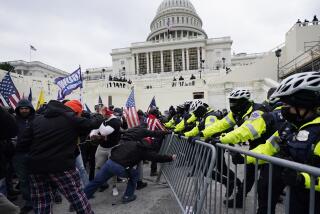U.S. Seizure of Lawyer Fees Held Illegal : Attorneys Jubilant Over Ruling in Test of New Crime Control Act
- Share via
Criminal defense lawyers across the country expressed jubilation Friday in the wake of a federal judge’s ruling that declared unconstitutional the government’s growing efforts to seize legal fees and subpoena fee information in major drug and racketeering cases.
The decision, issued by U.S. District Judge Pierre N. Leval in New York Thursday, quashed a subpoena seeking information about a fee, estimated by the government at $500,000, paid to prominent defense attorney Ivan Fisher by defendant Salvatore Catalano in a drug-trafficking case.
Case Anxiously Monitored
Fisher’s case has been anxiously monitored in the legal community, for it was seen as a key test of the government’s use of new laws that took effect last October as part of the Comprehensive Crime Control Act of 1984. The National Assn. of Criminal Defense Lawyers and the New York Criminal Bar Assn. submitted briefs in support of Fisher.
The trial judge’s ruling does not set a controlling precedent, but it is expected to influence other judges. The handful of related judgments handed down in recent months has been mixed and generally decided on narrow grounds. Leval’s ruling, by contrast, directly addressed the fundamental constitutional issues. The judge supported the defense attorneys’ positions on virtually every argument.
Ephraim Margolin, Fisher’s attorney and vice president of the National Assn. of Criminal Defense Attorneys, said: “This decision goes further than any ruling in this field. What we have now is perhaps not a controlling decision, but an extremely persuasive one. This is the most important case that has come along in criminal law in this field. We are delighted.”
The U.S. attorney for the Southern District of New York, Rudolph W. Giuliani, who sought the subpoena, said that, although this was “obviously an important ruling,” another federal judge in New York, David Edelstein, last March refused to quash a similar subpoena served against attorney Robert Simels.
The 2nd Circuit Court of Appeals on June 27 reversed Edelstein’s ruling and quashed the Simels subpoena but without addressing the constitutional issues. So Giuliani believes the issues remain unresolved.
Giuliani indicated that he probably will not appeal the current decision, because that would require delaying Catalano’s drug-trafficking trial, scheduled to begin Sept. 9.
The current legal confrontation began with an April, 1984, indictment that identified Catalano as a top boss of a massive heroin distribution and money-laundering enterprise. When the government could find few of Catalano’s assets, and he contended that he earned only $700 a week from a Queens bakery and pizza business, prosecutors last February subpoenaed fee information from Fisher.
They argued that they were seeking legitimate evidence that Catalano had a sizable illicit income. They contended also that, if Catalano were convicted, the new laws allowed them to seize Fisher’s fee as proceeds from drug trafficking.
In seeking to quash the subpoena, Fisher argued that it would violate the attorney-client privilege, Catalano’s Sixth Amendment right to counsel and Fifth Amendment right against self-incrimination.
Judge Leval agreed.
“If the statute applies to (Fisher),” he wrote, “its message to him is ‘do not represent this defendant or you will lose your fee.’ That being the kind of message lawyers are likely to take seriously, the defendant will find it difficult or impossible to secure representation . . . .”
Leval pointed out also that requiring Fisher to disclose fee information would create several conflicts of interest. A lawyer would be inclined not to become well informed about his client’s case, for that could endanger his fee by disclosing that it was the product of illegal activity. A lawyer would also have motive to negotiate a guilty plea that did not involve forfeiture of fees rather than fight the case and risk forfeiture.
Other Evidence Available
That does not make the fee evidence inadmissible, the judge added, but it does require that the government show that the evidence was both relevant and needed. The judge found that, in this case, the prosecutors could use other evidence to show the defendant had sizable assets.
“I acknowledge that a literal reading of the (new) statutes would seem to encompass the legal fee,” the judge concluded. “But the liability to forfeiture of bona fide legal fees paid to the indicted defendant’s trial attorney would raise such constitutional and ethical problems, I cannot conceive that this was intended by Congress, absent some indication in statute or legislative history. And, if it had been intended, such application would in all likelihood violate the Sixth Amendment.”
More to Read
Sign up for Essential California
The most important California stories and recommendations in your inbox every morning.
You may occasionally receive promotional content from the Los Angeles Times.













